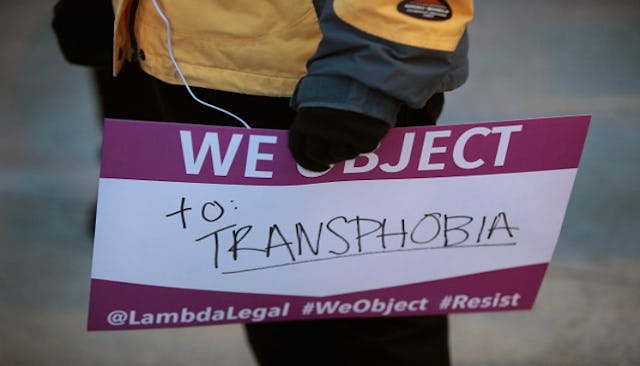Trans Friends, You Are Welcome To Pee Next To Me

The woman’s bathroom is a sacred place. We go there to pee. We go there to dump our Diva Cups, change our tampons, switch out our pads, reuse our sponges, or just generally cope with the bloodshed. We fix our makeup there, put on lipstick, and examine eyeshadow. We mess with our hair. We gossip. We make secret phone calls and send texts. We loiter. And of course, we use the toilet for its intended purpose.
Behind the sacred triangle-skirted totem marked “LADIES,” we take off our public faces. Here we steel ourselves for the world. Here we put on fresh selves. Here is our own red tent. It’s a place every woman deserves.
And every woman includes trans women.
Friend, you can pee next to me. I will pass you toilet paper under the stall, even if you’re standing up. No judgement — you’re one of us. Here in America, there are an estimated 1.4 million of you, according to UCLA’s Williams Institute, or 0.6% of the population.
As a woman, you deserve the same rights as any other woman, including the right to pee where you feel most comfortable. I’m not worried you’ll victimize me. I’m worried you’ll hog the hand dryer.
In fact, there’s actually no reason I should worry about you victimizing me. Media Matters for America studied the issue, with Wake Forest University graduate Carlos Maza leading the research efforts. Maza reported on Twitter that, according to their findings, “a man has never used an LGBT non-discrimination law to sneak into a bathroom.”
The Charlotte Observer found three cases in the last 17 years in which a biological male victimized a woman in a woman’s restroom in the entire United States. But these were all biological, heterosexual males — not transsexuals. On the other hand, places that have adopted transgender bathroom protections have had exactly zero issues. All you want to do is pee among those of your same gender. I understand, respect, and support that.
I also get that I’m not the one who should be worried about my safety — you are. Last year, 22 of you were murdered, the Human Rights Campaign reported. So far this year, we’ve lost six of you — all of you both transsexual and people of color, including one American Indian.
Most recently, Ciara McElveen was stabbed to death in New Orleans, days after another transgender woman, Chyna Doll Dupree, was shot to death in the same city. Ciara had to suffer the additional indignity of being misgendered by the Times-Picayune in early reports. The paper didn’t do the same to Dupree, a drag performer shot outside a shopping center, but did use what Mic calls her “dead name,” or her original birth name.
You die, and they can’t even get your name right. It’s a damn shame.
Since Trump’s brought it into the spotlight once again, the Supreme Court has declined to decide whether a transgender boy could use the boy’s bathroom at his high school. This means, of course, that the school can force Gavin Grimm, which the New York Times described as “an engaging yet slightly awkward young man,” to use the girls’ bathroom. Gavin has identified as a boy, he says, since he “was aware of the difference between boys and girls.” We were hoping they would take the case and rule on it — the way they ruled on gay marriage — and make discrimination against trans men and women illegal. That would include their right to use the bathroom of their correct gender, not the gender they were assigned at birth.
I 100% agree he should be in the men’s bathroom because he is male. Who does belong in my bathroom? People like Rebekah Bruesehoff, a purple-haired, pigtailed 10-year-old who was born a boy. She went to a protest this weekend with a sign reading, “I’m the SCARY TRANSGENDER person the media warned you about.” According to attn:, Rebekah’s mom says she “suffered from severe depression and anxiety before she started to live as her authentic self.” A picture of her with her sign has over 8,000 Facebook shares so far. Rebekah, come over and take the stall next to me.
The woman’s bathroom is a special place. Transgender women deserve that same sacred space, the same one we afford cis women. If we deny people like Gavin and Rebekah the right to use the space assigned to their gender, we deny their gender itself. And when we deny their gender, we deny something essential about them. We deny their personal identity. We try to make them into something they aren’t, into our own image, not their own. And that’s not even remotely okay, on any level.
So trans friends, you can pee next to me. And we can both worry about the cis guy outside, because that’s who data says is the real threat. To both of us.
This article was originally published on